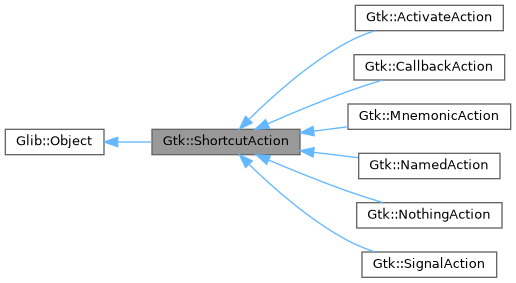Tracking if shortcuts should be activated. More...
#include <gtkmm/shortcutaction.h>

Public Types | |
| enum class | Flags { Flags::EXCLUSIVE = 1 << 0 } |
| List of flags that can be passed to action activation. More... | |
Public Member Functions | |
| ShortcutAction (ShortcutAction &&src) noexcept | |
| ShortcutAction & | operator= (ShortcutAction &&src) noexcept |
| ~ShortcutAction () noexcept override | |
| GtkShortcutAction * | gobj () |
| Provides access to the underlying C GObject. | |
| const GtkShortcutAction * | gobj () const |
| Provides access to the underlying C GObject. | |
| GtkShortcutAction * | gobj_copy () |
| Provides access to the underlying C instance. The caller is responsible for unrefing it. Use when directly setting fields in structs. | |
| Glib::ustring | to_string () const |
| Prints the given action into a human-readable string. | |
| bool | activate (Widget &widget, Flags flags=static_cast< Flags >(0), const Glib::VariantBase &args={}) |
| Activates the action on the widget with the given args. | |
Static Public Member Functions | |
| static GType | get_type () |
| Get the GType for this class, for use with the underlying GObject type system. | |
| static Glib::RefPtr< ShortcutAction > | parse_string (const Glib::ustring &string) |
| Tries to parse the given string into an action. | |
Protected Member Functions | |
| ShortcutAction () | |
Related Symbols | |
(Note that these are not member symbols.) | |
| Glib::RefPtr< Gtk::ShortcutAction > | wrap (GtkShortcutAction *object, bool take_copy=false) |
| A Glib::wrap() method for this object. | |
Detailed Description
Tracking if shortcuts should be activated.
Gtk::ShortcutAction is the object used to describe what a Gtk::Shortcut should do when triggered. To activate a ShortcutAction manually, activate() can be called.
ShortcutActions contain methods that allow easy presentation to end users as well as being printed for debugging.
All ShortcutActions are immutable, you can only specify their properties during construction. If you want to change an action, you have to replace it with a new one. If you need to pass arguments to an action, these are specified by the higher-level Gtk::Shortcut object.
GTK provides various actions:
- Gtk::MnemonicAction: a shortcut action that calls Gtk::Widget::mnemonic_activate()
- Gtk::CallbackAction: a shortcut action that invokes a given callback
- Gtk::SignalAction: a shortcut action that emits a given signal
- Gtk::ActivateAction: a shortcut action that calls Gtk::Widget::activate()
- Gtk::NamedAction: a shortcut action that calls Gtk::Widget::activate_action()
- Gtk::NothingAction: a shortcut action that does nothing
- See also
- Gtk::Shortcut
Constructor & Destructor Documentation
◆ ShortcutAction() [1/2]
|
noexcept |
◆ ~ShortcutAction()
|
overridenoexcept |
◆ ShortcutAction() [2/2]
|
protected |
Member Function Documentation
◆ activate()
| bool Gtk::ShortcutAction::activate | ( | Widget & | widget, |
| Flags | flags = static_cast< Flags >(0), |
||
| const Glib::VariantBase & | args = {} |
||
| ) |
Activates the action on the widget with the given args.
Note that some actions ignore the passed in flags, widget or args.
Activation of an action can fail for various reasons. If the action is not supported by the widget, if the args don't match the action or if the activation otherwise had no effect, false will be returned.
- Parameters
-
flags Flags to activate with. widget Target of the activation. args Arguments to pass.
- Returns
trueif this action was activated successfully.
◆ get_type()
|
static |
Get the GType for this class, for use with the underlying GObject type system.
◆ gobj() [1/2]
|
inline |
Provides access to the underlying C GObject.
◆ gobj() [2/2]
|
inline |
Provides access to the underlying C GObject.
◆ gobj_copy()
| GtkShortcutAction * Gtk::ShortcutAction::gobj_copy | ( | ) |
Provides access to the underlying C instance. The caller is responsible for unrefing it. Use when directly setting fields in structs.
◆ operator=()
|
noexcept |
◆ parse_string()
|
static |
Tries to parse the given string into an action.
On success, the parsed action is returned. When parsing failed, nullptr is returned.
The accepted strings are:
nothing, forGtk::NothingActionactivate, forGtk::ActivateActionmnemonic-activate, forGtk::MnemonicActionaction(NAME), for aGtk::NamedActionfor the action namedNAMEsignal(NAME), for aGtk::SignalActionfor the signalNAME
- Parameters
-
string The string to parse.
- Returns
- A new
Gtk::ShortcutAction.
◆ to_string()
| Glib::ustring Gtk::ShortcutAction::to_string | ( | ) | const |
Prints the given action into a human-readable string.
This is meant for debugging and logging. The form of the representation may change at any time and is not guaranteed to stay identical.
- Returns
- A new string.
Friends And Related Symbol Documentation
◆ wrap()
|
related |
A Glib::wrap() method for this object.
- Parameters
-
object The C instance. take_copy False if the result should take ownership of the C instance. True if it should take a new copy or ref.
- Returns
- A C++ instance that wraps this C instance.